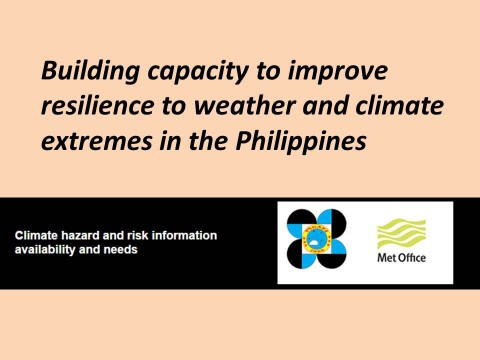PAGASA Partners with UK’s Met Office to Improve Local Early Warning Systems

OML Center Research Fellow Publishes Rappler Article on EDSA Air Quality
December 11, 2016
OML Center Welcomes its new Executive Director
December 11, 2016The Met Office, the national weather service of the United Kingdom (UK), has been engaged by the UK Department for International Development (DFID) to work in partnership with the Philippine Atmospheric, Geophysical and Astronomical Services Administration (PAGASA) in improving early warning systems through the 18-month project entitled “Building capacity to improve resilience to weather and climate extremes in the Philippines’’.
This technical collaboration that officially commenced in January 2015 is a response to the urgent need for resilience-building in all levels of government in the Philippines called upon by recent weather and climate events such as the landfall of Typhoon Yolanda in 2013. It aims to, among others, inform reconstruction plans; involve key stakeholders; build long-term capacity for weather forecasting and disaster resilience; aid in the delivery of quality weather and climate hazard warning capabilities; and apply novel science to provide information on climate risks.
Using a regional climate model developed by the Met Office, high-resolution future climate simulations that will aid in the construction of functional data are generated, analyzed, and integrated with sectoral information gathered through direct engagement with stakeholders and partner agencies to deliver the following:
- A situational assessment describing present arrangements for forecast and early warning systems;
- A synthesis of available climate information to support rebuilding decisions;
- An assessment of the current understanding of risks and risk mapping;
- High resolution regional climate scenarios relevant to assessing future typhoon-related risks; and
- An evaluation of future climate related risks.
The above, together with the in-process deliverables, (communication of findings, knowledge-sharing activities, and networking) intend to make a direct and significant impact on saving lives and building the nation.
As part of this work, the PAGASA is carrying out a 3-part online survey that can be accomplished until June 10, 2015 to evaluate the current climate hazard and risk information usage and needs from different stakeholders. Answers will help the proponents of the project to (1) understand which kind of information is available to you and your institution and (2) identify what is missing and what kind of information would be useful to facilitate your work for preparing coping with climate hazards, their associated risks and impacts.
The following link can be used to access the survey: http://www.surveymethods.com/EndUser.aspx?DFFB978FDF9C8289DB
For questions, concerns, or a request for a questionnaire in MS Word format, please contactmetoffsurvey@outlook.com

